

Step 2: Hitler’s Promises to Germany - The Rise of Hitler & Nazism. Hitler Made many promises to the country of Germany in order to come to power.

Most of the promises he made, he did not keep. After WWII Germany signed the Treaty of versailles which was the main cause of Germany's economic problems at the time. The U.S. made loans to Germany to help with its failing economy. But when the market crashed in 1929, the U.S. could not continue to help out Germany. This helped set up Hitler perfectly. Discussion Question: If you didn't know what was to come after 1933, would you believe all of Hitler's promises and why? Nazi Party Election Poster Urging German Workers To Vote… News Photo. Nazi Party Election Poster Urging German Workers To Vote… News Photo. Index. GHDI - Document. Over fourteen years have passed since that unhappy day when the German people, blinded by promises made by those at home and abroad, forgot the highest values of our past, of the Reich, of its honor and its freedom, and thereby lost everything.
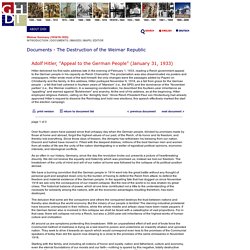
Since those days of treason, the Almighty has withdrawn his blessing from our nation. Discord and hatred have moved in. Filled with the deepest distress, millions of the best German men and women from all walks of life see the unity of the nation disintegrating in a welter of egoistical political opinions, economic interests, and ideological conflicts. As so often in our history, Germany, since the day the revolution broke out, presents a picture of heartbreaking disunity. We did not receive the equality and fraternity which was promised us; instead we lost our freedom. The delusion that some are the conquerors and others the conquered destroys the trust between nations and thereby also destroys the world economy.
GCSE Bitesize - Hitler's rise to power. Background & Overview of the Nazi Party (NSDAP) The National Socialist German Workers' Party (NSDAP), more commonly known as the Nazi Party, was a political party in Germany between 1920 and 1945.

Hi136-week10. What was the Role of the Wall Street Crash in Hitler's Rise to Power? On Tuesday 29th October 1929, the American Stock Market, Wall Street, crashed.
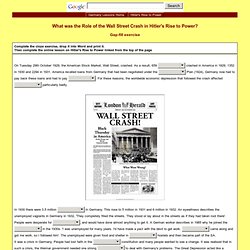
As a result, 659 crashed in America in 1929, 1352 in 1930 and 2294 in 1931. America recalled loans from Germany that had been negotiated under the Plan (1924). Germany now had to pay back these loans and had to pay . Primary Sources: Weimar Economics. Historische Zeitungen - Zeitungsinformationssystem. Digitalisierte Ausgaben zum 29.06.1919 (ZEFYS) Seitensuche ZEFYS > Jahresübersicht Start Metasuche Digitalisierte Zeitungstitel Jahresübersicht Erscheinungsländer Amtspresse Preußens DDR-Presse Internetressourcen Bibliographische Recherche Informationen zu Zeitungen Über uns english Kalender Auswahl.
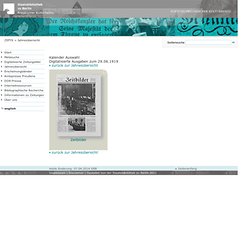
Versailler Vertrag - Der diktierte Frieden - Vertrag von Versailles. "Now Gents, which portion am I to carve for you!

" - (Nun meine Herren, welches Teil darf ich Ihnen abschneiden!) Britische Propagandakarte - Belgien, Russland, Frankreich und Britannien teilen sich das geschlachtete Schwein Deutschland auf. Versailler Vertrag Vorgeschichte Am 18. Am 1. "L'EUROPE FUTURE DE DEMAIN" - Französische Karte von 1915 Kriegsziele Frankreichs: Die Karte von 1915 zeigt verblüffende Ähnlichkeiten mit dem heutigen Mitteleuropa. Deutschland ist in sechs Staaten (Hannover, Westfalen, Württemberg, Bayern, Preußen und Sachsen) aufgeteilt, die angegebene Ostgrenze entspricht der heutigen Oder-Neiße-Linie zu Polen. Konkrete Friedensbemühungen der Mittelmächte Deutschland und Österreich-Ungarn gab es bereits seit 1916: Germany and Austria 1814-2000 - Mark Allinson.
Nazi Germany - The Depression - The Rise of Hitler N01d. The Great Depression in Germany - Weimar Germany. Unemployed Berliners queue during the Great Depression The Great Depression was a worldwide economic slump that began as an American crisis.
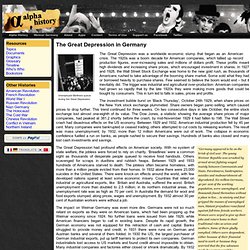
The 1920s was a boom decade for American companies, which tallied up record production figures, ever-increasing sales and millions of dollars profit. These profits meant high dividends and increasing share prices, which encouraged investment in shares. In 1927 and 1928, the Wall Street Stock Exchange was home to the new gold rush, as thousands of Americans rushed to take advantage of the booming share market. Some sold what they had or borrowed heavily to purchase shares. The investment bubble burst on ‘Black Thursday’, October 24th 1929, when share prices on the New York stock exchange plummeted.
The Great Depression had profound effects on American society. Rise of Hitler: Great Depression Begins. When the stock market collapsed on Wall Street on Tuesday, October 29, 1929, it sent financial markets worldwide into a tailspin with disastrous effects.
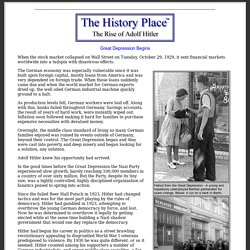
The German economy was especially vulnerable since it was built upon foreign capital, mostly loans from America and was very dependent on foreign trade. When those loans suddenly came due and when the world market for German exports dried up, the well oiled German industrial machine quickly ground to a halt. As production levels fell, German workers were laid off. Along with this, banks failed throughout Germany. Savings accounts, the result of years of hard work, were instantly wiped out. Terms of use: Private home/school non-commercial, non-Internet re-usage only is allowed of any text, graphics, photos, audio clips, other electronic files or materials from The History Place.